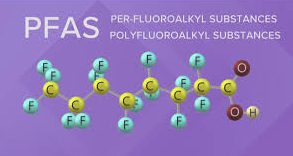Liberated Brands (Liberated) announced that starting with Spyder Skiwear’s Fall 20204 season, it will be free of per- and polyfluorinated substances (PFAS). With this initiative, the company said it will also introduce innovations in waterproof materials and Durable Water Repellent (DWR) treatments, joining other footwear and apparel companies rushing to meet new PFAS rules and regulations.
Liberated’s portfolio of brands includes Volcom, Billabong, Quiksilver, Spyder, RVCA, Roxy, Honolua, and Captain Fin.
Most brands are addressing state regulations and put in place actions for 2024 and beyond. Companies agree that removing PFAS is the right thing to do, but many are concerned about the changes and the work needed with what many believe is exceptionally short notice as states move to regulate.
 The Wright-Pierce engineering company defines PFAS compounds “as a group of synthetic chemicals that are resistant to heat, water and oil and have been used in a wide range of consumer products and industrial applications, including food packaging, clothing, fire-fighting foams, and upholstery.” At times referred to as “forever chemicals,” PFAS are resistant to typical degradation processes due to their highly stable chemical structure.
The Wright-Pierce engineering company defines PFAS compounds “as a group of synthetic chemicals that are resistant to heat, water and oil and have been used in a wide range of consumer products and industrial applications, including food packaging, clothing, fire-fighting foams, and upholstery.” At times referred to as “forever chemicals,” PFAS are resistant to typical degradation processes due to their highly stable chemical structure.
The engineering firm suggests that exposure to certain PFAS compounds is linked to various health problems in the liver, kidneys, immune system, and nervous system and could cause developmental and reproductive problems in infants and children, including low birth weight, accelerated puberty and skeletal changes. Research suggests links to cancer, thyroid disease and endocrine disruption. The persistence of PFAS in the environment and the water supply presents a serious risk to public health.
In July 2021, the U.S. Environmental Protection Agency (EPA) validated two methods to test for 24 PFAS in wastewater, surface water and groundwater. This validation marks a big step forward in efforts to monitor and treat PFAS, as the compounds have long presented analytical challenges due to their widespread presence in various environmental samples. These chemical changes could occur during the preservation and storage of samples and the need for very low test limits.
California-based Liberated said it “deployed an initial assessment of its Spyder products this week, resulting in a multiple-season plan to phase out PFAS from its branded skiwear.” The company said this initiative “is expected to lead the industry forward as Liberated works with its fabric partners to refine its raw material selection and commercialization procedures, ensuring the top quality of material performance and compliance.”
“We are extremely proud to announce that Spyder skiwear produced by Liberated will now be PFAS-free,” said Brady Collings, general manager of Spyder at Liberated, the brand’s core operating partner in North America, Europe, Japan, and Australia. “This decision is a big deal for the active and outdoor industry, and we’re proud to be at the forefront. We look forward to taking the next step in providing high-quality products that are better for our consumers and the environment.”
Apparel, footwear, sports and fitness, outdoor, and winter sports industries have been working to assess and address restrictions on PFAS and are reworking collections since California first put restrictions on products made for kids under 12 years old. It now appears that the federal government is taking additional steps for a more cohesive plan across the U.S. as the European Commission has attempted to do via the European Chemicals Agency (ECA). Those efforts include regulating everything from clothing to “granules and mulches on sports pitches and playgrounds.”
This month, the U.S. Environmental Protection Agency announced its latest efforts to protect communities and the environment from the health risks posed by certain PFAS. It proposes two rules that would add to the agency’s comprehensive approach to tackling PFAS pollution in America. EPA said these proposals would also help deliver on President Biden’s agenda to “protect public health better and advance environmental justice.”
“From day one, President Biden promised to address harmful forever chemicals and other emerging contaminants to better protect communities from exposure, and today’s actions are just the latest from the EPA as we continue to deliver on the president’s commitment,” said EPA Administrator Michael S. Regan. “Thanks to strong partnerships with our co-regulators in the states, we will strengthen our ability to clean up contamination from PFAS, hold polluters accountable and advance public health protections.”
The EPA proposes modifying the definition of hazardous waste as it applies to cleanups at permitted hazardous waste facilities. This modification would ensure that the EPA’s regulations reflect the agencies and authorized states’ authority to require the cleanup of the full range of substances that the Resource Conservation and Recovery Act (RCRA) intended, including emerging chemicals of concern, such as PFAS, that may present substantial hazards, at permitted facilities. The agency said the regulations do not clearly and accurately reflect the full authority granted to EPA by Congress.
The EPA also proposes to amend its RCRA regulations to add multiple PFAS compounds as hazardous constituents. These PFAS would be added to the list of substances identified for consideration in facility assessments and, where necessary, further investigation and cleanup through the corrective action process at hazardous waste treatment, storage and disposal facilities. These proposed rules would strengthen protections for communities and drinking water supplies located near the 1,740 permitted hazardous waste facilities in the U.S.
Corrective action under RCRA requires facilities that treat, store or dispose of hazardous waste to protect health and the environment by investigating and cleaning up hazardous releases into the soil, groundwater, surface water, and air. Hazardous waste cleanups are a critical part of the EPA’s focus on the environment and help protect public health by addressing disparities in access to a clean and safe environment.
The EPA will be publishing these proposals in the Federal Register this month. The agency’s “Definition of Hazardous Waste Applicable to Corrective Action from Solid Waste Management Units” proposed rule will be open for public comment for 30 days, whereas the “Listing of Specific PFAS as Hazardous Constituents” proposed rule will be open for public comment for 60 days. Upon publication, the EPA welcomes comments on each proposal.
If the EPA is going to test for it, the active lifestyle industry is going to have to stay ahead of the curve of shifting to materials and processes that are compliant – before its too late.
To stay current on EPA regulations and initiatives regarding PFAS, go here.
Images courtesy Liberated, Spyder, Wright-Pierce















